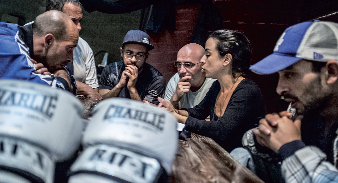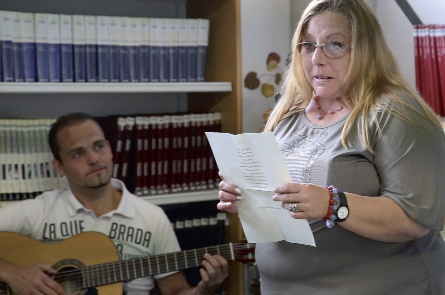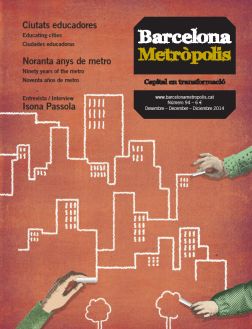Art transcends boundaries, including those within a society. The project teatroDENTRO and the writing contest Vivències have a shared ambition to bring words and culture to new and unexpected places, such as Barcelona’s prisons.

teatroDENTRO
TeatroDENTRO offers constant dramatic training four hours a day at Quatre Camins prison to give its members more work opportunities once they recover their freedom.
Urban and cosmopolitan settings encourage the social inclusion of groups at risk of exclusion through the use of a number of educational means. Long-term sustained education is a vital process, one that goes beyond mere schooling to address achieving personal well-being and a healthy social life. If by nature we are social beings, a city is an ideal social vehicle for carrying out educational activities.
It is in this setting of cities and citizens that we find the two projects that are presented in this article, teatroDENTRO and the writing contest Vivències, which show Barcelona as an exemplar for social inclusion through education. They share an ambition to bring words and culture to new and unexpected places, such as Barcelona’s prisons. Because art can transcend boundaries.
Created two years ago, the teatroDENTRO company forms part of the transFORMAS project, a collection of professionals that investigates the relationship between the performing arts and social transformation. The teatroDENTRO workshop differs from others by offering regular artistic education for four hours a day at Quatre Camins prison, giving inmates a better chance of finding work once they are released. “The prisoners find the project to be a kind of oasis, a place to really express themselves, and in some cases they can even find themselves for the first time,” says Eva García, the director of transFORMAS. Prison life takes place in a Manichean world, where the boundary between good and bad is so firmly entrenched that the inmates become inured to it. The project has proven to the company that culture has many different outlets for expression, although working inside a prison is in itself very tough: “You have to build a trusting relationship without forgetting where you are and what you’re doing,” concludes Eva.
The Institució de les Lletres Catalanes (ILC), under the direction of Laura Borràs, has put into action various projects to spread letters and literature across diverse contexts and communities, including those – such as the prisons – that may not feel much connection to begin with, but with time can end up fully engaged in them. The ILC wants to bring words to as many places as possible, as words can help us to ease suffering, to forget and to find ourselves anew.

© Noemí Roset
A Can Brians inmate reciting a poem of her own in the poetry competition organised by the Institution of Catalan Letters.
Examples of its projects include Cicle de lletres i salut (by the Interdepartmental Plan for Public Health of Catalonia – PINSAP) and literary talks on trains to mark Sant Jordi’s Day; recently, with the collaboration of the poet Carles Rebassa, the ILC has been organising a yearly short stories and poetry competition for prison inmates, which leads to publication of a volume called Vivències. This year its third edition was presented at the Can Brians 1 prison.
It is with this sense of purification and release from past life experiences that art can be used as a tool for transformation, for catharsis. As a result, many can find themselves again, believe in themselves, try to find their place in society and, ultimately, feel that they are a part of it.
Note
Video of the poetry reading in Can Brians, 7 May 2014 (author: Noemí Roset): http://vimeo.com/95132016.



